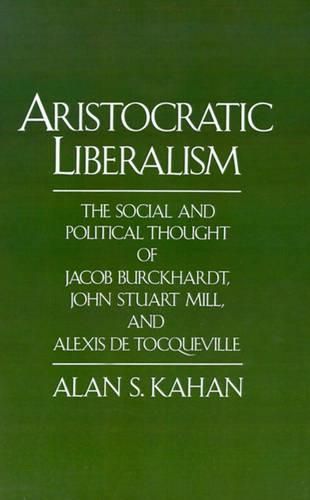Readings Newsletter
Become a Readings Member to make your shopping experience even easier.
Sign in or sign up for free!
You’re not far away from qualifying for FREE standard shipping within Australia
You’ve qualified for FREE standard shipping within Australia
The cart is loading…






Although the term ‘liberalism’ is widely used to describe a variety of social and political ideas, it has been an especially difficult concept for historians to define. Alan Kahan’s work makes significant progress toward such a definition by linking three great nineteenth-century thinkers in a single intellectual and ideological tradition he calls ‘Aristocratic Liberalism’. An important component of Kahan’s contribution is his ability to cross national boundaries to find similarities in the thought of Burckhardt, Mill, and Tocqueville. None of these thinkers came from aristocratic backgrounds, but they shared a distaste for the masses and middle classes, a fear and contempt of mediocrity, a suspicion of the centralized state, opposition to the commercial spirit, and a deep pessimism about the possibility of implementing their goals in the near future. Kahan concludes by correcting prevalent misconceptions about nineteenth-century liberalism (for example, that it was the representative political movement of the ascendant middle class) and by providing a typology of liberalism that will undoubtedly spark scholarly debate.
$9.00 standard shipping within Australia
FREE standard shipping within Australia for orders over $100.00
Express & International shipping calculated at checkout
Although the term ‘liberalism’ is widely used to describe a variety of social and political ideas, it has been an especially difficult concept for historians to define. Alan Kahan’s work makes significant progress toward such a definition by linking three great nineteenth-century thinkers in a single intellectual and ideological tradition he calls ‘Aristocratic Liberalism’. An important component of Kahan’s contribution is his ability to cross national boundaries to find similarities in the thought of Burckhardt, Mill, and Tocqueville. None of these thinkers came from aristocratic backgrounds, but they shared a distaste for the masses and middle classes, a fear and contempt of mediocrity, a suspicion of the centralized state, opposition to the commercial spirit, and a deep pessimism about the possibility of implementing their goals in the near future. Kahan concludes by correcting prevalent misconceptions about nineteenth-century liberalism (for example, that it was the representative political movement of the ascendant middle class) and by providing a typology of liberalism that will undoubtedly spark scholarly debate.